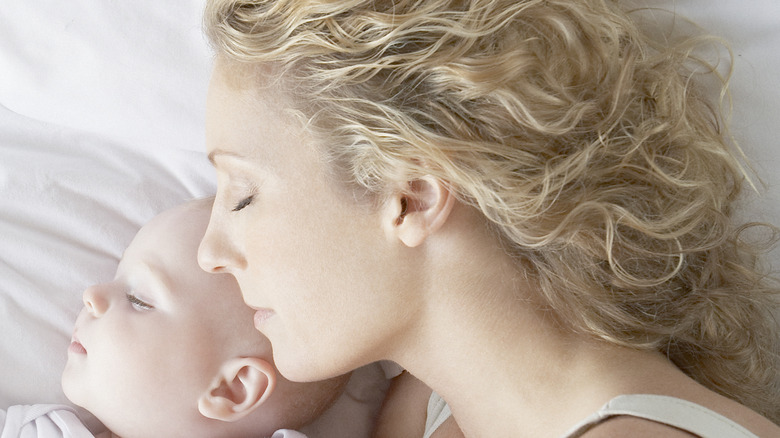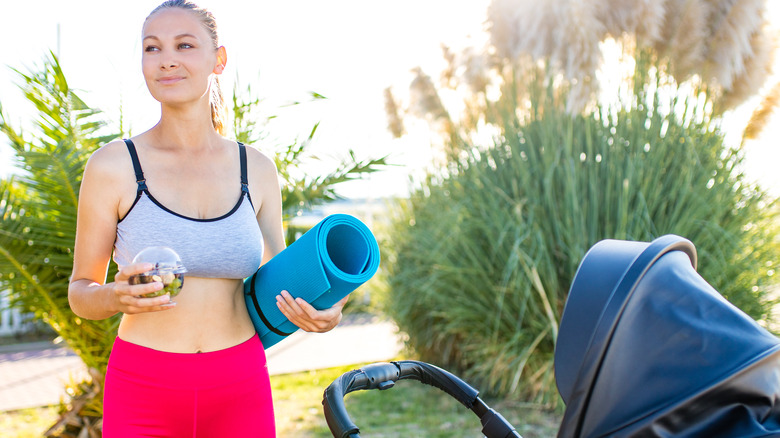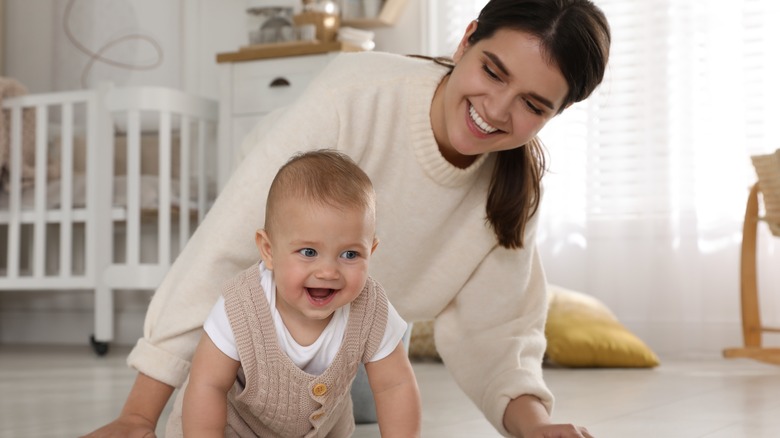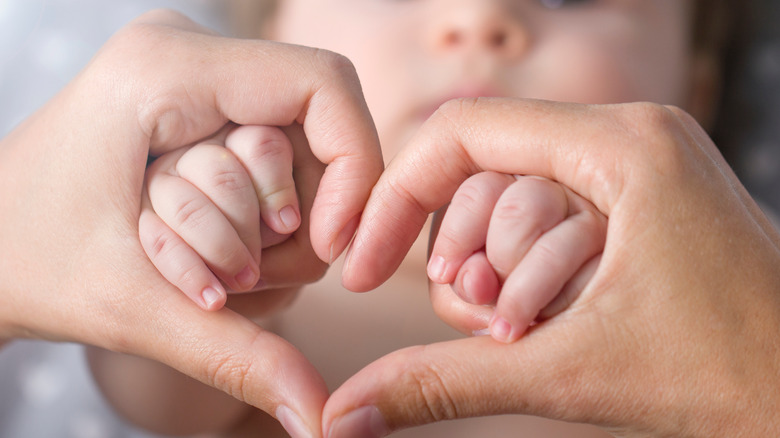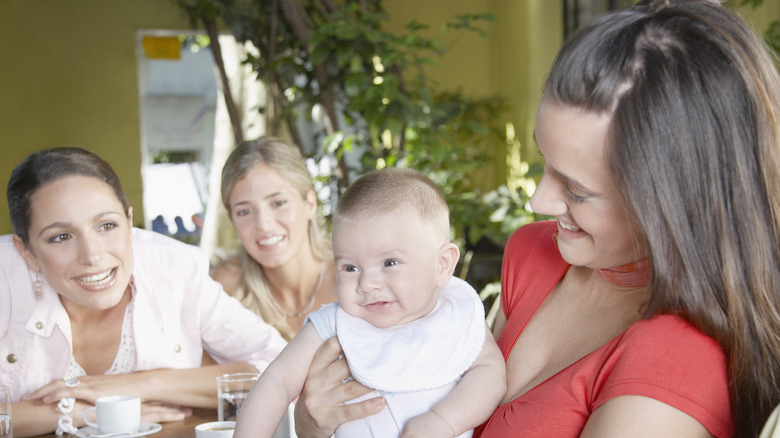How To Ease Back Into Life When You're Postpartum
So no one told you life was going to be this way? Your nipples hurt, you're exhausted, and your baby won't stop wailing. Welcome to life postpartum. Motherhood is life-altering, and from the moment your bundle of joy is placed in your arms, you can't help but feel overwhelmed with emotion. With around one in seven women developing postpartum depression, per NIH, many new moms focus so much on the well-being of their newborn that they forget their own needs.
Although massive physical and psychological changes happen after giving birth, the good news is that, like most women, you will look back at this as a magical time in your life. But to get the most out of being a new mom, you may need to shift your mindset and focus on your overall well-being. Every mom has a different path; what works for some might not work for others. To help guide you find your postpartum plan, we have a few expert-derived tips to help you get through the most bitter-sweet time of your life.
Be kind to yourself
You have survived a nine-month pregnancy and endured many physical and mental changes, and now it's time to focus on yourself. Implementing a self-care routine will help you find the strength to look after a newborn. Your main priorities should be feeding your baby and taking care of yourself, so it's a good idea to ask someone else to take care of all responsibilities. Jennifer Brewer, a registered midwife in Toronto, recommends a whole week of bed rest after childbirth or at least a few days of rest if that is not possible. She also advises limiting guests, "don't invite people who are going to come in and just expect you to get up and make them something," Brewer told Today's Parent.
After giving birth, you may not feel like yourself, and the important thing is to focus on your overall health rather than weight loss. The weight gained in pregnancy assists with your recovery and helps with breastfeeding. To get back on track, eating a healthy and balanced diet will build up your energy levels and give you the strength to care for your baby (via Stanford Medicine).
Ask for help
In the months leading up to childbirth, the focus is largely on welcoming a baby into the world, with many women overlooking the importance of postpartum well-being. Being a new mom can definitely be overwhelming; there is so much to do when all you want to do is rest. So whether you need help with small tasks or the courage to discuss your mental status, it's essential to reach out and get the assistance you need.
According to Dr. Shari Lawson, a medical director of general obstetrics and gynecology, new moms often struggle with anxiety. In addition, Dr. Lawson says, "disrupted sleep and being overtired can amplify these feelings," per Johns Hopkins Medicine. To help combat these feelings, one of the best things a new mom can do is accept help from a partner, friends, or family. Then, once you receive support, take time for some much-needed self-care.
Have realistic expectations
We live in an Instagram and Pinterest-obsessed world that depicts a world that is far from reality, so if your house is a mess or your not bonding with the baby like you thought you would be, remember to be kind to yourself, you're surviving on little sleep, and you can't do it all! Trying to do it all can lead to burnout. According to a 2019 study in Clinical Psychological Science, burnout is a serious condition that makes parents feel insecure in their parenting abilities and creates a sense of detachment from their children.
Pediatrician Harvey Karp, the author of the popular book "The Happiest Baby on the Block," says the number one stress for parents is exhaustion, which can skew their worldview. For this reason, it's important to remember that life with babies can be unpredictable. So, rather than focusing on what you thought life should be, a better approach is to "create a new plan without being overly disappointed or self-judging," he told Baby Chick.
Try to exercise again
The many benefits of exercise for postpartum women include gaining more energy and mental health boosts. The good news is that most women who had an uncomplicated pregnancy and vaginal delivery are safe to exercise just a few days after having a baby if they are cleared to do so by their ob-gyn. However, many women want to dive into intense exercise, which might not be the best idea. So instead, try simple postpartum exercises and aim to stay active for 20 to 30 minutes a day (via ACOG).
According to Dr. Carrie Pagliano, a physical therapist specializing in women's health, there is no one-size-fits-all method when returning to exercise postpartum. Instead, it's best to listen to your body and get cleared by a doctor before implementing an exercise plan. For breastfeeding moms, it's recommended to feed the baby before working out. "No one wants to run three miles with full breasts," Pagliano told What to Expect.
Keep taking your prenatal vitamins
Speaking to your doctor before you stop taking your prenatal vitamins is essential. While the World Health Organization recommends that postpartum women continue taking a prenatal vitamin for at least three months after delivery, it's still necessary to determine which vitamins you should take after delivery and for how long based on your health needs. One study found that prenatal and postnatal vitamins with folate, DHA, Vitamin D, and iodine are great for fetal brain development and are even beneficial to the baby when breastfeeding (via NIH). It is recommended that breastfeeding women who follow restrictive diets (such as vegans or vegetarians) take a pre or postnatal vitamin for as long as they breastfeed their child, according to the CDC.
However, taking vitamins should not replace a well-balanced diet. Getting enough nutrients in your diet is vital for your body to heal and feel more energized, especially since you are adjusting to a new lifestyle that will make you prone to exhaustion and sleep deprivation, according to Penn Medicine.
Kegel exercise will help you
After having a baby, the last thing you want to hear is another thing you "should" be doing. Still, Kegel exercises are strongly advised as they benefit your long-term recovery, especially if you had a vaginal delivery. According to eMedicine Health, Kegel exercises (also called pelvic muscle exercises) "help prevent incontinence, strengthen vaginal muscles, prevent accidentally passing gas or stool, and improve orgasms."
The best way to perform the Kegel exercise is to ensure your bladder is empty and tighten the pelvic floor muscles for five seconds, then relax it for five seconds. Try to repeat this ten to 20 times a day and eventually aim to do three sets of ten Kegel exercises daily (via Emedicine Health). "If you think of your core as a box, the pelvic floor is the bottom. Boxes with a good, strong bottom are generally most helpful," Dr. Helene Darmanin, an orthopedic and pelvic health physical therapist, told Today. The good news is unlike other forms of exercise, Kegel exercises can be done almost anywhere.
Enjoy the little wins
When your usual routine is thrown out the window, and there is a stroller in the hallway, you might feel like your house is a mess and that you have not accomplished much, but remind yourself that you have! There are so many little wins as a new mom that you can celebrate. Maryellen Mullin, a marriage and family therapist, told William James College, "If you start being more gentle with yourself, it will rub off on how you feel and strengthen your relationship with your child."
Mullin says a positive approach to parenting includes little celebrations throughout the day and recommends shifting your focus to your daily wins by sharing them with your partner in a text message or by them writing down to remind yourself how much you accomplished. Although finding those little wins can be difficult during days of little sleep and almost no adult interaction, Mullins believes that being a person who sees the glass half full is worth it, but building a more positive mindset does take time.
Avoid rapid weight loss
Experts say you should think twice before you scroll mindlessly on Instagram and see celebrities looking thin just days after having a baby; their journey is very different from most moms. Dr. Laura Riley, a high-risk-pregnancy expert and spokeswoman for the American College of Obstetricians and Gynecologists, says rapid postpartum weight loss culture harms many new moms. Dr. Riley notes that celebrities have access to resources that most new moms do not and that moms should not consider weight loss plans until after the six-week postpartum doctor visit (via WebMD).
The American College of Obstetricians and Gynecologists encourages physical activity and a well-balanced diet during and after pregnancy but recommends consulting your medical team about the best way to approach exercise. The focus of postpartum life should be on the overall well-being of both the mother and the new baby rather than unrealistic weight loss standards.
Make time for your partner
Your life has changed, and finding time for your partner might seem impossible, but understanding that you and your other half are going through this change together can make life much easier. Trying to rekindle the flame after having a baby is hard work. Still, according to Dr. Debra Wickma, an ob-gyn and sexual medicine specialist, it all starts with "mutual appreciation, empathy, teamwork, and respect" (via Banner Health).
Sometimes, household chores, the lack of sexual intimacy, and child-rearing duties can cause resentment between partners. The first step is acknowledging the new demands on your relationship and then communicating your feelings, as this is also a form of intimacy that elevates your emotional connection with your partner. "When you talk about hopes and dreams and fears and longings and your secret desires, especially in an intimate setting, that's intimacy," Dr. Dennis Sugrue, a clinical associate professor of psychiatry, told WebMD.
Remember that comparison is the thief of joy
Every women's postpartum journey is unique, so don't waste your energy comparing yourself to a non-existent standard of recovery or lifestyle. Many factors impact your recovery journey, such as your age, whether or not you went through a difficult childbirth, how much support you have around you, and how many children you already have. For example, a postpartum mom in their early twenties might find bouncing back into shape a breeze compared to a mom in her late thirties who has just delivered her fourth child, per VeryWellFamily.
Dr. Carrie J. Pagliano, a physical therapist who assists postpartum moms, says, "the comparison trap is one of the most insidious of all." She says the problem is that women compare themselves to other women, and sometimes non-first-time moms compare their postpartum journey to their previous experiences with other children. According to Dr. Pagliano, this is a mistake because every postpartum experience is different, and "we can't compare our 'now selves' to our previous selves from a few years ago. They are fundamentally different people!" A better approach is to recognize that comparison is a barrier to success. You should plan to achieve your goals in small steps instead of focusing on what life used to look like or trying to copy someone else's recovery journey.
Mental check-ins are important
Most new mothers experience short-lived postpartum "baby blues" after childbirth, but this becomes more severe for some moms. According to Women's Health, if you have sad thoughts or feelings of despair that last more than two weeks, you may have postpartum depression. Postpartum depression impacts your beliefs, daily life, and physical health. Fortunately, many resources can help when things get too overwhelming.
Dr. Karp says the best way to approach postpartum mental health issues is to be open and reach out to medical experts. "This is a medical physiologic issue. It's temporary. It gets better, but it requires treatment to get better," he told People. He added that sometimes postpartum depression could be challenging to identify as it looks different for each person. For some, it may be an "anxious depression" that prevents a new mom from completing daily activities. To overcome this stage, Dr. Karp recommends starting your recovery journey by talking to somebody you feel comfortable with and trust.
If you, or someone you know, are experiencing mental and/or substance use disorders, reach out to the SAMHSA's National Helpline, a free, confidential, 24/7, 365-day-a-year treatment referral and information service (in English and Spanish).
You may feel like your identity has changed; embrace it
It is normal to feel like a newborn has come into your world and turned it upside down. Unfortunately, for many new moms, understanding their new identity as a 'mom' takes time, and postpartum mental health issues are often linked with identity issues. According to 2009 research from James Madison University, most moms experiencing postpartum depression and anxiety have "difficulty navigating or adapting to the new maternal identity." The study suggests seeking professional help as quickly as possible, as mental health can impact family life and a woman's ability to bond with a baby.
Having a baby causes a women's brain to change. If you are a woman whose identity has been centered around your career, this can "shake your foundations," states psychologist Dr. Janna Kortez (via Harvard Business Review). The journey to finding yourself again is long and complicated. It takes time and patience and requires you to review your idea of success and lower your standards, which might mean giving "yourself a gold star just for survival," says Dr. Kotez.
Consider returning to work and making realistic plans
Every woman's life is different; some can return to work when they feel like it, while others may have to return for financial reasons. In both cases, returning to work after having a baby is an "intense physical and psychological adjustment," Dr. Denise Rousseau, a professor of organizational behavior and public policy, told Harvard Business Review. Working moms often feel like they are missing out on their child's milestones and become riddled with guilt, which is entirely normal. Dr. Rousseau says going back to work after having a baby is emotional and overwhelming. She advises new moms to not "be too hard" themselves, and to recognize that returning to work with new priorities will look different this time, so allow yourself "to learn how to do the job you did before differently."
Daisy Wademan Dowling, the founder, and CEO of Workparent, a consulting firm for working parents and employers, recommends communicating openly with your boss about your life changes and asking for advice. She says connecting with supportive parents who understand what you are going through is also a good idea. Finding an online support network with people in your neighborhood who also have young children is a great resource.
Reach out to friends and family and plan social outings
According to research into postpartum maternal health, social support is a "major buffer" of postpartum depression (via NIH). The study, published in Maternal Health Journal, concluded that knowing what support new moms need is an integral part of a new mom's recovery process and that to prevent postpartum depression, there should be a strong focus on social support. Although you may be good at relying on medical experts for postpartum care, recognizing the value of creating a network of friends and family you trust will help you get the care and support you need.
Dr. Angela Glover, an ob-gyn, says new moms have differing needs, and "some moms may require a large village, while others may only need a few people to lean on. Either way, it's OK to ask for help." Dr. Glover says that whether it's your first or fifth child, all moms need a village to help them, so reaching out to others will help you along your postpartum journey (via ACOG). You may feel like you have to do it alone, but according to the experts, including your loved ones in your life will make them feel helpful and improve your mental health, so go on, let someone else take care of the baby while you enjoy a long nap or catch up with old friends — you deserve it!
